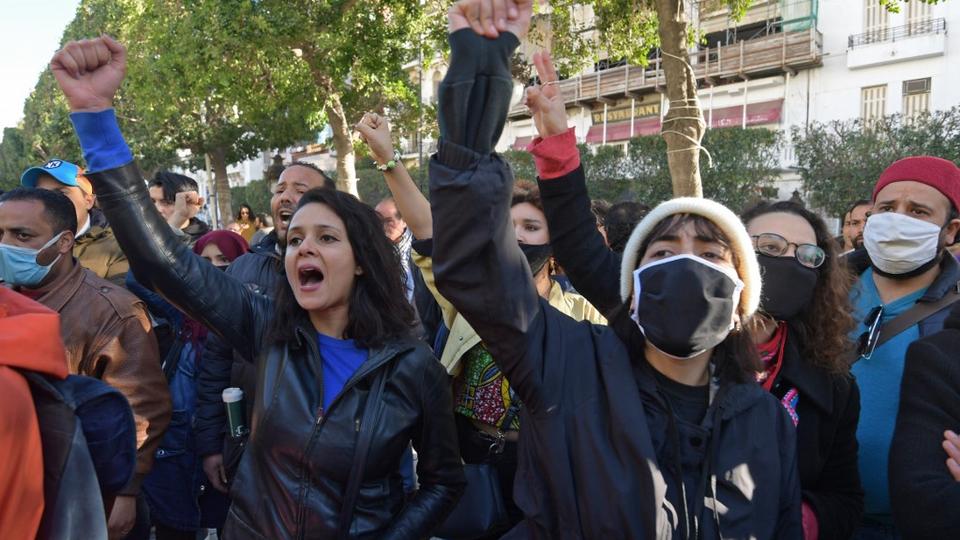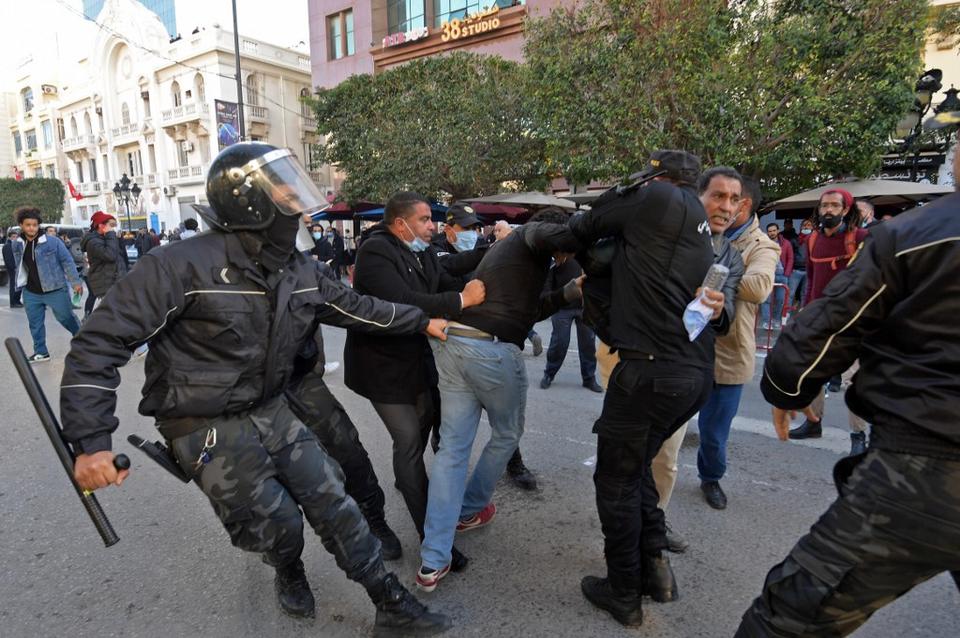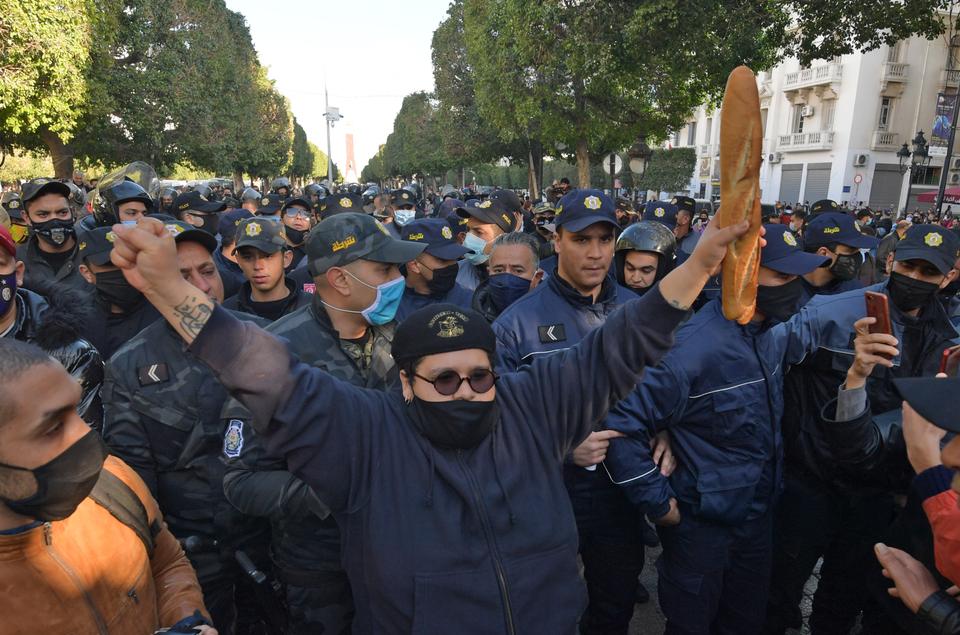Defying movement restrictions aimed at reining in spiralling novel coronavirus infections, students and activists have flocked to a key boulevard in Tunis, shouting slogans against poverty, corruption and police repression.

Tunisian protesters raise their fists as they chant during an anti-government demonstration on the Habib Bourguiba avenue in the capital Tunis, January 19, 2021. (AFP)
Tunisia has seen angry daytime protests against the government, following four nights of confrontations between police and disaffected youths that has led to hundreds of arrests.
Defying movement restrictions on Tuesday, aimed at reining in spiralling novel coronavirus infections, students and activists flocked to a key boulevard in Tunis, shouting slogans against poverty, corruption and police repression.
"There's despair everywhere. The virus comes on top of poverty and unemployment. Ten years (since the revolution), our demands still haven't been met," said Donia Mejri, a 21-year-old student.
Protests in Tunis and the coastal city of Sfax, organised via social media, came after nights of rioting with young people lobbing rocks at police in exchange for teargas, and more than 600 people arrested by Monday.
"The crisis is real and the anger is legitimate and so are the protests, but the violence is unacceptable and we will confront it with the force of law," Prime Minister Hichem Mechichi said in a televised speech on Tuesday night, after protests appeared to have died down.
READ MORE: Young Tunisians clash with police on fourth consecutive night
Tunisia has seen angry daytime protests against the government, following four nights of confrontations between police and disaffected youths that has led to hundreds of arrests.
Defying movement restrictions on Tuesday, aimed at reining in spiralling novel coronavirus infections, students and activists flocked to a key boulevard in Tunis, shouting slogans against poverty, corruption and police repression.
"There's despair everywhere. The virus comes on top of poverty and unemployment. Ten years (since the revolution), our demands still haven't been met," said Donia Mejri, a 21-year-old student.
Protests in Tunis and the coastal city of Sfax, organised via social media, came after nights of rioting with young people lobbing rocks at police in exchange for teargas, and more than 600 people arrested by Monday.
"The crisis is real and the anger is legitimate and so are the protests, but the violence is unacceptable and we will confront it with the force of law," Prime Minister Hichem Mechichi said in a televised speech on Tuesday night, after protests appeared to have died down.
READ MORE: Young Tunisians clash with police on fourth consecutive night

Tunisian security officers detain a protester during an anti-government demonstration on the Habib Bourguiba avenue in the capital Tunis, on January 19, 2021. (AFP)
Much of the unrest has hit working class neighbourhoods, where anger is boiling over soaring unemployment and a political class accused of having failed to deliver good governance a decade on from the 2011 revolution.
President Kais Saied urged young Tunisians to refrain from further violence even as social media posts called for new rallies.
"Do not attack or insult anyone and do not damage private property or state institutions," he said on Monday, warning that "chaos" does not allow progress.
'We want our rights'
But Ghazi Tayari, a civil society activist in Sfax, said the daytime protesters had "no desire to destroy or steal".
"We want our rights, and we won't stop until this government falls," he said.
Tunisia's tourism-reliant economy shrank by nine percent last year, consumer prices have spiralled and one third of young people are unemployed.
Tunisia often sees protests in January, a month of several key anniversaries including former president Zine el Abidine Ben Ali's fall from power on January 14, 2011.
Large gatherings are banned due to the coronavirus pandemic and police have been deployed, with an overnight curfew extended from 8:00 pm to 4:00 pm.
READ MORE: Tunisia arrests hundreds as riots continue across the country
Much of the unrest has hit working class neighbourhoods, where anger is boiling over soaring unemployment and a political class accused of having failed to deliver good governance a decade on from the 2011 revolution.
President Kais Saied urged young Tunisians to refrain from further violence even as social media posts called for new rallies.
"Do not attack or insult anyone and do not damage private property or state institutions," he said on Monday, warning that "chaos" does not allow progress.
'We want our rights'
But Ghazi Tayari, a civil society activist in Sfax, said the daytime protesters had "no desire to destroy or steal".
"We want our rights, and we won't stop until this government falls," he said.
Tunisia's tourism-reliant economy shrank by nine percent last year, consumer prices have spiralled and one third of young people are unemployed.
Tunisia often sees protests in January, a month of several key anniversaries including former president Zine el Abidine Ben Ali's fall from power on January 14, 2011.
Large gatherings are banned due to the coronavirus pandemic and police have been deployed, with an overnight curfew extended from 8:00 pm to 4:00 pm.
READ MORE: Tunisia arrests hundreds as riots continue across the country

A Tunisian protester lifts a loaf of bread as security officers confront demonstrators during an anti-government rally on the Habib Bourguiba avenue in the capital Tunis, on January 19, 2021. (AFP)
'Denial of the anger'
Tunisia's divided political leadership has stayed largely silent on the protests by youths dismissed by many commentators as "delinquents".
Messages posted online on Tuesday called for protests to keep going, and activists warned demonstrations were likely to continue until major action was taken to address the root cause of anger.
"There is a denial and an underestimation of the anger among young people," said Olfa Lamloum, who heads the International Alert peace-building campaign group.
Tunisia's 11 successive governments since the ousting of Ben Ali "have not had a strategy to answer the central question of employment", she said.
Lamloum, who works in some of the most deprived areas of the country, warned that "as long as there is a purely security response, with mass arrests, and no social or political response, tensions will remain high".
The social unrest comes at a time of economic crisis, worsened by the impact of the Covid-19 pandemic, that has deepened poverty.
Widespread popular discontent is now driving many to leave.
Tunisians made up the largest number of irregular migrants, more than 12,000, who arrived in Italy last year on boats crossing the Mediterranean.
Clashes in towns
In the latest unrest, hundreds of youths in the capital battled police in several districts, including the vast Ettadhamen suburb.
In Sfax, the second largest city, protesters blockaded roads with burning tyres, an AFP correspondent reported.
Clashes were also reported in the towns of Gafsa, Le Kef, Bizerte, Kasserine, Sousse and Monastir.
The powerful Tunisian trade union confederation UGTT has called for an end to the violence, while noting that the constitution guarantees the right to demonstrate.
READ MORE: Ten years since Bouazizi’s fatal act of defiance, where does Tunisia stand?
'Denial of the anger'
Tunisia's divided political leadership has stayed largely silent on the protests by youths dismissed by many commentators as "delinquents".
Messages posted online on Tuesday called for protests to keep going, and activists warned demonstrations were likely to continue until major action was taken to address the root cause of anger.
"There is a denial and an underestimation of the anger among young people," said Olfa Lamloum, who heads the International Alert peace-building campaign group.
Tunisia's 11 successive governments since the ousting of Ben Ali "have not had a strategy to answer the central question of employment", she said.
Lamloum, who works in some of the most deprived areas of the country, warned that "as long as there is a purely security response, with mass arrests, and no social or political response, tensions will remain high".
The social unrest comes at a time of economic crisis, worsened by the impact of the Covid-19 pandemic, that has deepened poverty.
Widespread popular discontent is now driving many to leave.
Tunisians made up the largest number of irregular migrants, more than 12,000, who arrived in Italy last year on boats crossing the Mediterranean.
Clashes in towns
In the latest unrest, hundreds of youths in the capital battled police in several districts, including the vast Ettadhamen suburb.
In Sfax, the second largest city, protesters blockaded roads with burning tyres, an AFP correspondent reported.
Clashes were also reported in the towns of Gafsa, Le Kef, Bizerte, Kasserine, Sousse and Monastir.
The powerful Tunisian trade union confederation UGTT has called for an end to the violence, while noting that the constitution guarantees the right to demonstrate.
READ MORE: Ten years since Bouazizi’s fatal act of defiance, where does Tunisia stand?
No comments:
Post a Comment